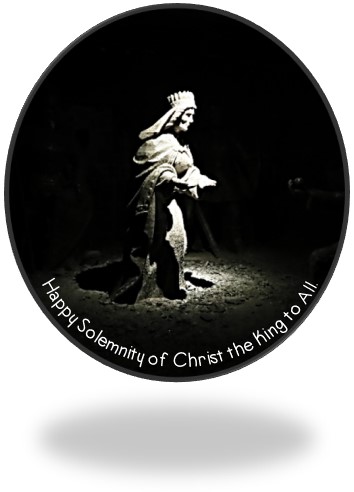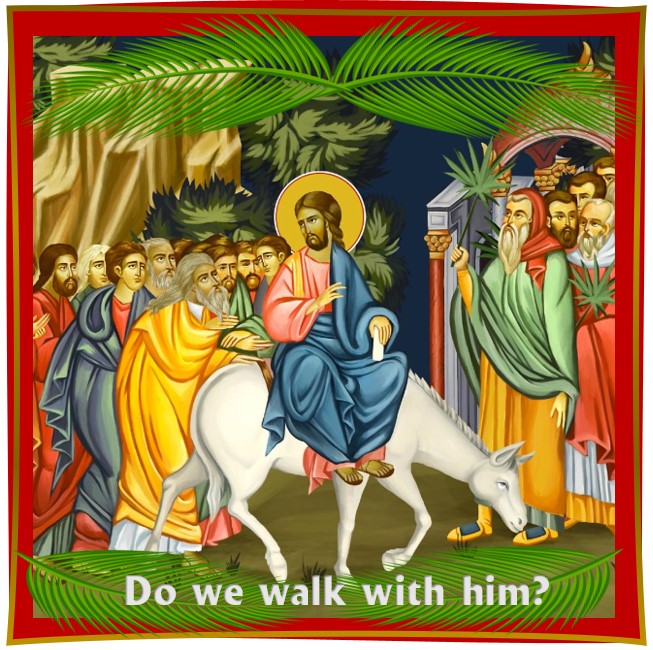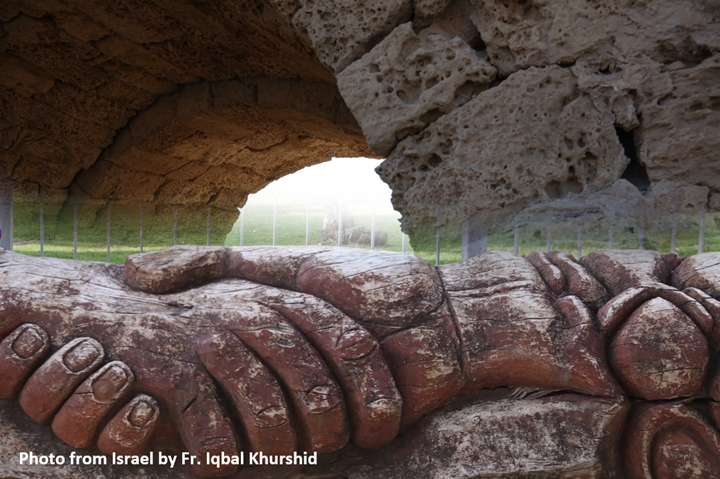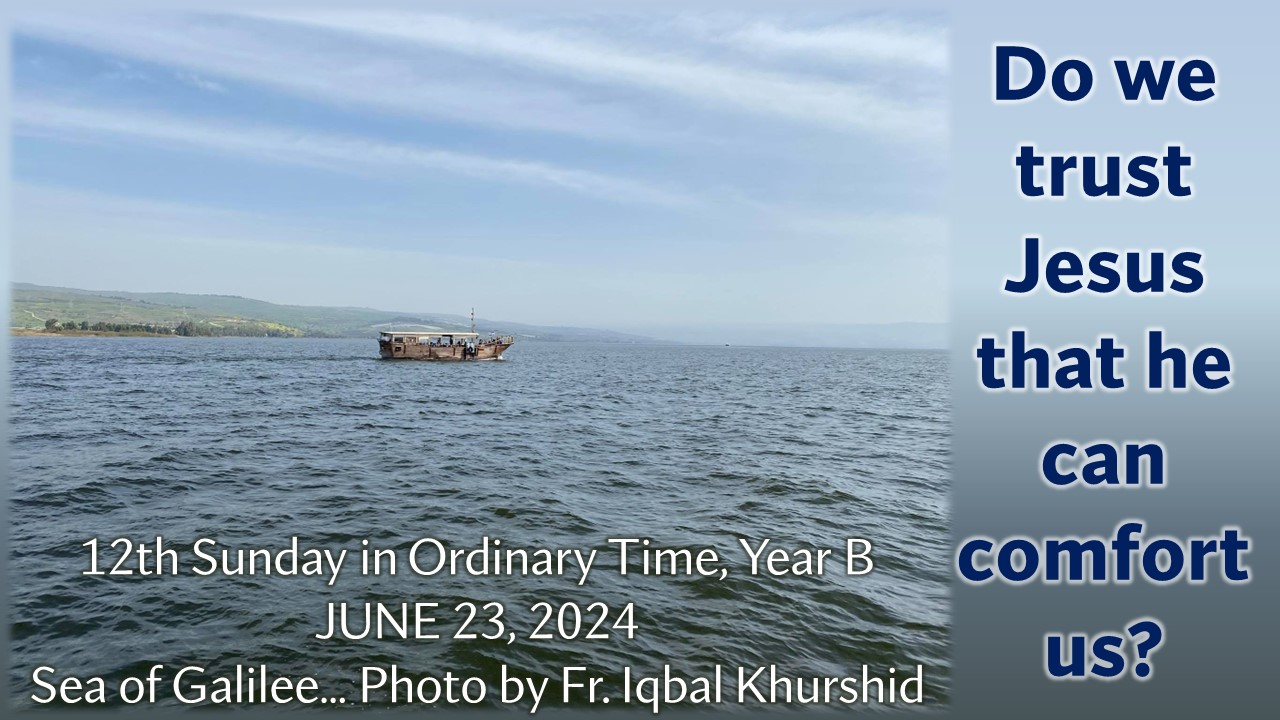
Solemnity of Christ the King (34th Sunday) Year C ~ November 20, 2022
HE REMEMBERS US
Today we conclude our liturgical year with the celebration of the Solemnity of Christ the King which is the crown of the liturgical year. This solemnity invites us to meditate on the humility, love and compassion of the King who became obedient to death even death on a cross. As Prophet Zechariah exclaims: “Rejoice greatly, O daughter Zion! Shout aloud, O daughter Jerusalem! Lo, your king comes to you; triumphant and victorious is he, humble and riding on a donkey, on a colt, the foal of a donkey”. Jesus is our King, but he is not a king like other kings or rulers of the world who loves power and wealth, but he is a king who speaks the truth “Jesus answered, “My kingdom does not belong to this world. If my kingdom did belong to this world, my attendants would be fighting to keep me from being handed over to the Jews. But as it is, my kingdom is not here.” So, Pilate said to him, “Then you are a king?” Jesus answered, “you say I am a king. For this I was born and for this I came into the world, to testify to the truth. Everyone who belongs to the truth listens to my voice.” He is the King of Kings and Ruler of the rulers. He is a king who brings joy into the life of marginalized, rejected, outcast and poor of the society “For he has clothed me with a robe of salvation, and wrapped me in a mantle of justice, like a bridegroom adorned with a diadem, like a bride bedecked with her jewels”.
There is beautiful note by Origin, the Priest about Jesus’ kingdom to remind us to always believe and trust in him. “The kingdom of God, in the words of our Lord and Savior, does not come for all to see; nor shall they say: Behold, here it is, or behold, there it is, but the kingdom of God is within us, for the word of God is very near, in our mouth and in our heart. Thus, he who prays for the coming of God’s kingdom prays rightly to have it within himself, that there it might grow and bear fruit and become perfect. For God reigns in each of his holy ones. Anyone who is holy obeys the spiritual laws of God, who dwells in him as in a well-ordered city. The Father is present in the perfect soul, and with him Christ reigns, according to the words: We shall come to him and make our home with him. Thus, the kingdom of God within us, as we continue to make progress, will reach its highest point when the Apostle’s words are fulfilled, and Christ, having subjected all his enemies to himself, will hand over his kingdom to God the Father, that God may be all in all. Therefore, let us pray unceasingly with that disposition of soul which the Word may make divine, saying to our Father who is in heaven: Hallowed be your name; your kingdom come.
He continues to reflect on the Kingdom of God “Note this too about the kingdom of God. It is not a sharing of justice with iniquity, nor a society of light with darkness, nor a meeting of Christ with Belial. The kingdom of God cannot exist alongside the reign of sin. Therefore, if we wish God to reign in us, in no way should sin reign in our mortal body; rather we should mortify our members which are upon the earth and bear fruit in the Spirit. There should be in us a kind of spiritual paradise where God may walk and be our sole ruler with his Christ. In us the Lord will sit at the right hand of that spiritual power which we wish to receive. And he will sit there until all his enemies who are within us become his footstool, and every principality, power, and virtue in us is cast out. All this can happen in each one of us, and the last enemy, death, can be destroyed; then Christ will say in us: O death, where is your sting? O hell, where is your victory? And so, what is corruptible in us must be clothed with holiness and incorruptibility; and what is mortal must be clothed, now that death has been conquered, in the Father’s immortality. Then God will reign in us, and we shall enjoy even now the blessings of rebirth and resurrection”.
Jesus being our King always remembers us in our difficulties and suffering. He knows how to cover our weaknesses. He is like a painter who have the power to cover any physical disability or spiritual weakness we have in our life. Once upon a time, there was a Kingdom. The king there only had one leg and one eye, but he was very intelligent and kind. Everyone in his kingdom lived a happy and a healthy life because of their king. One day the king was walking through the palace hallway and saw the portraits of his ancestors. He thought that one day his children will walk in the same hallway and remember all the ancestors through these portraits. But the king did not have his portrait painted. Due to his physical disabilities, he wasn’t sure how his painting would turn out. So, he invited many famous painters from his and other kingdoms to the court. The king then announced that he wants a beautiful portrait made of himself to be placed in the palace. Any painter who can carry out this should come forward. He will be rewarded based on how the painting turns up. All the painters began to think that the king only has one leg and one eye. How can his picture be made very beautiful? It is not possible and if the picture does not turn out to look beautiful then the king will get angry and punish them. So, one by one, all started to make excuses and politely declined to make a painting of the king. But suddenly one painter raised his hand and said that I will make a very beautiful portrait of you which you will surely like. The king became happy hearing that and other painters got curious. The king gave him the permission and the painter started drawing the portrait. He then filled the drawing with paints. Finally, after taking a long time, he said that the portrait was ready! All the courtiers, other painters were curious and nervous thinking, how can the painter make the king’s portrait beautiful because the king is physically disabled? What if the king didn’t like the painting and gets angry? But when the painter presented the portrait, everyone in the court, including the king, were left stunned. The painter made a portrait in which the king was sitting on the horse, on the one-leg side, holding his bow and aiming the arrow with his one eye closed. The king was very pleased to see that the painter has made a beautiful portrait by cleverly hiding the king’s disabilities. The King gave him a great reward. Christ the King has painted us with his blood on the Cross with his love. Prophet Isaiah says, “Surely he has borne our infirmities and carried our diseases; yet we accounted him stricken, struck down by God, and afflicted.” (53:4).
In the First Reading we read that David is anointed as a King of Israel who ruled the House of Israel for 40 years. He was the man after God’s own heart who pleased God and was rewarded by unending kingdom “a shoot will rise from Jesse” to rule over Israel. Even in the Gospel of Luke (1:26-38) we read “and his kingdom will have no end as God will give him the throne of his Father David”. Through Christ’s Kingdom, people will experience mutual respect and love.
The apostle Paul, in the second reading, taken from the letter to the Colossians, offers us a profound vision of the centrality of Jesus. He presents Christ to us as the first-born of all creation: in him, through him and for him all things were created. He is the centre of all things, he is the beginning: Jesus Christ, the Lord. God has given him the fullness, the totality, so that in him all things might be reconciled (Col 1:12-20). He is the Lord of creation; he is the Lord of reconciliation. This image enables to see that Jesus is the centre of creation; and so, the attitude demanded of us as true believers is that of recognizing and accepting in our lives the centrality of Jesus Christ, in our thoughts, in our words and in our works. And so, our thoughts will be Christian thoughts, thoughts of Christ. Our works will be Christian works, works of Christ; and our words will be Christian words, words of Christ. But when this centre is lost, when it is replaced by something else, only harm can result for everything around us and for ourselves.
Besides being the centre of creation and the centre of reconciliation, Christ is the centre of the people of God. Today, he is here in our midst. He is here right now in his word, and he will be here on the altar, alive and present amid us, his people. We see this in the first reading which describes the time when the tribes of Israel came to look for David and anointed him king of Israel before the Lord (2 Sam 5:1-3). In searching for an ideal king, the people were seeking God himself: a God who would be close to them, who would accompany them on their journey, who would be a brother to them.
Christ, the descendant of King David, is really the “brother” around whom God’s people come together. It is he who cares for his people, for all of us, even at the price of his life. In him we are all one, one people, united with him and sharing a single journey, a single destiny. Only in him, in him as the centre, do we receive our identity as a people. Finally, Christ is the centre of the history of humanity and the centre of the history of every individual. To him we can bring the joys and the hopes, the sorrows and troubles which are part of our lives.
When Jesus is the centre, light shines even amid the darkest times of our lives; he gives us hope, as he does to the good thief in today’s Gospel. The Gospel in fact presents the kingship of Jesus as the culmination of his saving work, and it does so in a surprising way. “The Christ of God, the Chosen One, the King” appears without power or glory: he is on the cross, where he seems more to be conquered than conqueror. His kingship is paradoxical: his throne is the cross; his crown is made of thorns; he has no sceptre, but a reed is put into his hand; he does not have luxurious clothing but is stripped of his tunic; he wears no shiny rings on his fingers, but his hands are pierced with nails; he has no treasure but is sold for thirty pieces of silver. Christ lowered himself to us out of this love, he lived our human misery, he suffered the lowest point of our human condition: injustice, betrayal, and abandonment.
In the Gospel we can also see that the attitude of people towards Jesus is very insulting and humiliating. They are mocking him without any respect, even a thief who is being punished for his own faults, is scolding Jesus. I believe most of the times we have the same attitude towards Jesus when we ignore his teaching. Many times, we are similar to the nonbelievers who mock, scold and insult Jesus and considered him just a myth. And Holy Father Pope Francis reflecting on the Gospel says “In order to receive the kingship of Jesus, we are called to struggle against this temptation, called to fix our gaze on the Crucified One, to become ever more faithful to him. How many times, even among ourselves, do we seek out the comforts and certainties offered by the world. How many times are we tempted to come down from the Cross. The lure of power and success seem an easy, quick way to spread the Gospel; we soon forget how the Kingdom of God works”.
Jesus being our King concludes his salvific mission with “Today you will be with me in paradise”. And that is the moment when he opens the doors of acceptance to everyone and invites everyone to “come and see”. And as soon as we give God the chance, he remembers us. He is ready to cancel our sin completely and forever because his memory – unlike our own – does not record evil that has been done or keep score of injustices experienced. God has no memory of sin, but only of us, of each of us, we who are his beloved children. And he believes that it is always possible to start anew, to raise ourselves up because he “has written our names on the palms of his hands” and “he will never be unfaithful because he can not deny himself” as St. Paul says.
A King had a male servant who, in all circumstances always said to him; My king, do not be discouraged because everything God does is perfect, no mistakes. One day, they went hunting and a wild animal attacked the king, the servant managed to kill the animal but couldn’t prevent his majesty from losing a finger. Furious and without showing gratitude, the King said; if God was good, I would not have been attacked and lost one finger.
The servant replied, “Despite all these things, I can only tell you that God is good and everything He does is perfect, He is never wrong”. Outraged by the response, the king ordered the arrest of his servant. Later, he left for another hunt and was captured by savages who use human beings for sacrifice. In the altar, the savages found out that the king didn’t have one finger in place, he was released because he was considered not “complete” to be offered to the Gods.
On his return to the palace, he authorized the release of his servant and said, “My friend, God was good to me. I was almost killed but for lack of a single finger I was let go. But I have a question; If God is so good, why did he allow me to put you in jail? He replied, “My king, if I had gone with you, I would have been sacrificed because I have no missing finger”.
Everything God does is perfect; he is never wrong. Often, we complain about life, and the negative things that happen to us, forgetting that nothing is random, and that everything has a purpose. And God remembers us always despite our shortcomings and failures because he loves us so much that he died on the Cross to save us all and give eternal life.
Other Sermons In This Series

Palm Sunday (6th Sunday of Lent) Year A ~ March 26, 2023
March 31, 2023

3rd Sunday of Lent – Year C – March 20, 2022
March 18, 2022

12th Sunday in Ordinary Time, Year B ~ June 23, 2024
June 20, 2024

